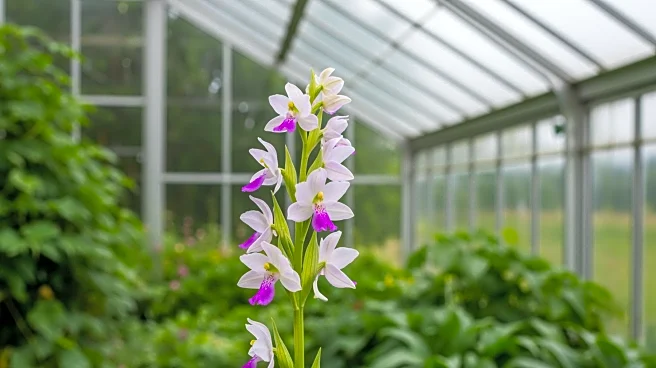What's Happening?
The Fen Orchid, a rare wild plant, has been successfully cultivated in Great Britain, reducing its threat status from extinction. Cambridge University Botanic Garden, in collaboration with Plantlife and
Royal Botanic Gardens Kew, has been working since 2008 to reintroduce and increase the number of Fen Orchids. The plant, which thrives in moist mossy environments, had suffered due to habitat loss from drainage and abandonment of fens. Previously found at only four sites in the UK, the Fen Orchid now exists at ten sites, with a population exceeding 10,000 plants. This achievement marks a significant conservation success, attributed to dedicated partnership efforts.
Why It's Important?
The successful cultivation of the Fen Orchid represents a significant victory for conservationists, highlighting the importance of collaborative efforts in biodiversity preservation. This development offers hope amidst global challenges of climate change and biodiversity loss. The Fen Orchid's recovery underscores the potential for similar conservation projects to restore other threatened species. It also emphasizes the need for ongoing conservation efforts to ensure the plant continues to thrive in its current and former habitats. The project serves as a model for conservation strategies, demonstrating the impact of sustained, cooperative action.
What's Next?
The focus now shifts to ensuring the Fen Orchid's continued survival and expansion within its native range. Conservationists aim to maintain its presence at existing sites and facilitate its growth in new areas. This will require ongoing monitoring and management to protect its habitat from further degradation. The success of this project may inspire similar initiatives for other endangered species, potentially leading to broader ecological restoration efforts. Stakeholders, including conservation organizations and local communities, are expected to play a crucial role in these future endeavors.
Beyond the Headlines
The Fen Orchid's recovery highlights ethical considerations in conservation, such as the responsibility to protect biodiversity for future generations. It also raises awareness about the ecological importance of fens and the need to preserve such habitats. The project may influence cultural attitudes towards conservation, encouraging greater public engagement and support for environmental initiatives. Long-term, this success could contribute to shifts in policy and funding priorities, promoting more comprehensive approaches to biodiversity conservation.









